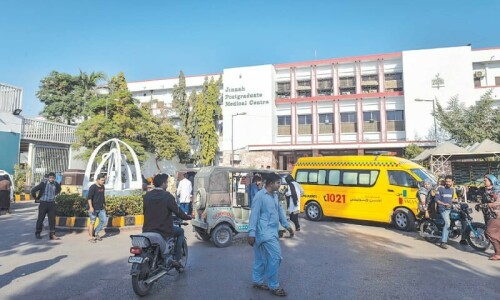
KARACHI: Dynasties are forged, and dynasties are destroyed on the battlefield. And the example of the Ottomans, considered to be the last Muslim empire, has had a similar beginning and end. Once rulers of vast swathes of land over three continents — Europe, Asia, and Africa, including Islam’s sacred cities Makkah, Madinah and Jerusalem — the Ottoman sultans were the topic of a well-attended talk at the Aga Khan University on Tuesday.
Speaking at the Sixth Sense Forum lecture series was Dr Iftikhar Salahuddin, an ENT surgeon and photographer, who has authored Jerusalem — A Journey Back in Time.
Dr Salahuddin shared photographs and maps while charting the trajectory of the Ottoman Empire which he said “in its heyday covered three continents, spanned more than 550 years, and was ruled by 37 sultans. Some were very brave and ambitious and struck fear in the heart of Europe. Many sultans bequeathed to history lovely architecture but this glorious period of five centuries ended in an inglorious way on the battlefield after being defeated by the West”.
Since the fourth century the Roman Empire was divided and battling several schisms, in particular the breaking of the church. The Muslim world, said Dr Salahuddin, was not united either. “It was in utter chaos and ruled by not one, but three khalifas all at one time trying to claim authority and rulership over the Muslims around the world. The Abbasids ruled from Damascus, the Fatimids from Cairo, and Abd-ar-Rahman III in Al Andalus claimed Khilafat from Cordoba, Spain.”
During this chaos in the Muslim world, he explained how an army of nomadic herdsmen descended from the steppes of Eurasia and settled in Persia, referred to as the Turks. From among these tribes were the Seljuks, led by Tughral Baig.
How the Seljuks, after consolidating power in Persia, made a decisive victory against the Christian world of Byzantines was discussed in great deal by Dr Salahuddin. It was in 1071, at the battle at Manzikert, where the legendary Byzantines were defeated and this defeat rang alarm bells across Europe.
“The Muslims were now at the doorstep of Christendom.”
Dr Salahuddin then fast forwarded to the 13th century when another tribe of nomads, the Mongols, pursued the Seljuks who at the time had control over Anatolia.
“The Seljuks were unable to match the might of the Mongols and as a result, the province was scattered into a patchwork of small, independent states. By the dawn of the 14th century, one of the states was led by Othman who laid down the foundation of the Ottoman Empire.”
What kept the talk from becoming a mundane history lesson were several interesting titbits shared by Dr Salahuddin. One such was regarding the grandson of Othman, Sultan Murad and his annexation of the Balkan states. As Murad was expanding the empire, he introduced a novel way to incorporate the minority Christians into his army.
“The law required that the Christians in his territory offer their sons to the state as a kind of protection tax for the minority, and officers of the Ottoman Empire went house to house searching for the best and smartest young men. Once the boys were selected they were converted to Islam and given the finest education. The best among them were taken to the palace and the others were conscripted into the army. These were called the Janissaries.”
Dr Salahuddin also delved into the constant feature among the Ottoman sultans — the practice of fratricide, of brother killing brother for the throne. According to him, Mehmed II even institutionalised it and passed it as a law which was given the ‘divine’ seal of approval by the ulema after quoting Quranic verses, regarding sedition, out of context.
The 19-year-old Sultan Mehmed II, and his invasion and capture of Constantinople which he renamed Istanbul, declaring it as capital of the Muslim Ottoman Empire, were discussed in great detail. Mehmed’s lineage was also charted and how he and his heirs shaped the Ottoman Empire, allowing it to expand beyond comprehension.
Many in the audience became even more engaged in the talk when Dr Salahuddin brought up the tale of Suleiman the Magnificent and his wife, Hürrem Sultan, popularly immortalised in the television drama Mera Sultan.
Dr Salahuddin also delved into how the Gutenberg printing press reached the Ottoman Empire but was not welcomed. “Their explanation was that it would be blasphemous to subject the Turkish script, which was in Arabic, to mechanical printing. So for almost 300 years the technology of printing books remained banned among the Muslims.”
How the Ottoman Empire suffered when it aligned itself with the Germans, which was the losing side against the Allies during World War I, was also discussed.
Dr Salahuddin then narrated Mustafa Kemal Atatürk’s rise to power and how he managed to, after much struggle and support from the Turkish people, declare the Republic of Turkey, moving the capital from Istanbul to Ankara.
Dr Salahuddin’s closing words at the talk regarding Turkey being in transition can be considered as a wake-up call considering the political turmoil the world is experiencing today. “The ruling party in Turkey is gradually unravelling the country and it does not know in what direction the country is headed.” Well, neither does the rest of the world.
Published in Dawn, February 1st, 2017













































Dear visitor, the comments section is undergoing an overhaul and will return soon.